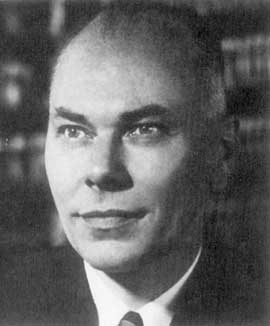- Howard H. Aiken
Infobox Scientist
name = Howard Hathaway Aiken

image_width = 180px
caption = Howard Aiken
birth_date = birth date|1900|3|8
birth_place =Hoboken, New Jersey
death_date = death date and age|1973|3|14|1900|3|8
death_place =St. Louis, Missouri
residence =United States
citizenship = American
ethnicity =
field =computing
work_institutions =Harvard University
alma_mater =University of Wisconsin-Madison Harvard University (doctorate)
doctoral_advisor =
known_for = Automatic Sequence Controlled Calculators Harvard Mark I - IV
prizes =Harry H. Goode Memorial Award (1964)Edison Medal (1970)
Howard Hathaway Aiken (
March 8 ,1900 –March 14 1973 ) was a pioneer incomputing , being the primary engineer behindIBM 'sHarvard Mark I computer.Biography
He studied at the
University of Wisconsin-Madison and later obtained his Ph.D. in physics atHarvard University in 1939. During this time, he encountereddifferential equation s that he could only solve numerically. He envisioned an electro-mechanical computing device that could do much of the tedious work for him. This computer was originally called the Automatic Sequence Controlled Calculator (ASCC) and later renamedHarvard Mark I . With help fromGrace Hopper and funding fromIBM , the machine was completed in 1944. In 1947, Aiken completed his work on theHarvard Mark II computer. He continued his work on the Mark III and theHarvard Mark IV . The Mark III used some electronic components and the Mark IV was all-electronic. The Mark III and Mark IV used magnetic drum memory and the Mark IV also hadmagnetic core memory .Aiken was inspired by
Charles Babbage 'sDifference Engine . He is supposed to have said (in 1947): "Only six electronic digital computers would be required to satisfy the computing needs of the entire United States." This remark is also attributed toThomas J. Watson , but was probably said by neither.In 1958 he received the UW-Madison College of Engineering Engineers Day Award, in 1964 he received the
Harry H. Goode Memorial Award , and in 1970, Aiken receivedIEEE 'sEdison Medal 'For a meritorious career of pioneering contributions to the development and application of large-scale digital computers and important contributions to education in the digital computer field.'Howard Aiken was also an Officer in the
United States Navy Reserve .He retired to
Fort Lauderdale, Florida , and died onMarch 14 1973 during a trip toSt. Louis, Missouri . [cite news |first= |last= |authorlink= |coauthors= |title=Howard H. Aiken, Built Computer. Developer of the Mark I Dies. Was Harvard Professor. Taught Until 1961. |url= |quote=Dr. Howard Hathaway Aiken, who in the late nineteen-thirties conceived the design for the world's first large-scale computer, the Mark I, in cooperation with engineers of the International Business Machines Corporation, died in his sleep early Wednesday on a visit to St. Louis. He was 73 years old and lived in Fort Lauderdale, Fla. |publisher=New York Times |date=March 16 1973 |accessdate=2008-05-29 ]External links
*MacTutor Biography|id=Aiken
* [http://www.americanheritage.com/articles/magazine/it/1999/4/1999_4_56.shtml Father of the computer age]
* [http://www.engr.wisc.edu/eday/eday1958.html UW-Madison College of Engineering Engineers' Day 1958 Award Recipients - Howard Aiken]
* [http://www.cbi.umn.edu/oh/display.phtml?id=33 Oral history interview with Robert Hawkins] atCharles Babbage Institute , University of Minnesota, Minneapolis. Hawkins discusses the Harvard-IBM Mark I project that he worked on at Harvard University as a technician as well as Howard Aiken's leadership of the project.
* [http://www.cbi.umn.edu/oh/display.phtml?id=34 Oral history interview with Richard M. Bloch] atCharles Babbage Institute , University of Minnesota, Minneapolis. Bloch describes his work at the Harvard Computation Laboratory for Howard Aiken on the Mark I.
* [http://www.cbi.umn.edu/oh/display.phtml?id=35 Oral history interview with Robert V. D. Campbell] atCharles Babbage Institute , University of Minnesota, Minneapolis. Campbell discusses the contributions of Harvard and IBM to the Mark I project.References
Wikimedia Foundation. 2010.
